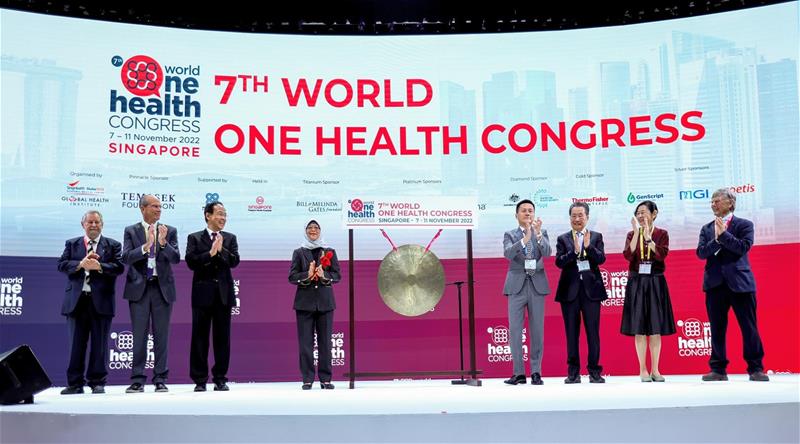SingHealth Institutions will NEVER ask you to transfer money over a call. If in doubt, call the 24/7 ScamShield helpline at 1799, or visit the ScamShield website at www.scamshield.gov.sg.

Guest-of-Honour Mdm Halimah Yacob, President of the Republic of Singapore, poses with Congress organisers and leadership from SingHealth and Duke-NUS for a commemorative photo after striking the ceremonial gong that officially opened the Congress
With all the focus on preparedness, prevention must not be forgotten, urged Dr Monique Eloit, Director General of the World Organisation for Animal Health, as she addressed delegates at the seventh World One Health Congress, which kicked off at the Sands Expo and Convention Centre in Marina Bay earlier today, 7 November.
“We urgently need to transform our relationship with the environment and the way we address pathogens’ emergence and spread. When talking about prevention, preparedness, response, please do not neglect the first P—prevention, which is the first crucial step to stop or at least limit spillovers of zoonotic diseases from animals to humans,” she said as she called for continued support for global One Health efforts, which can be the “transversal pillar” to help achieve the vision of a healthier future.
Dr Eloit’s remarks echoed those made earlier by the Congress’ Guest-of-Honour President of the Republic of Singapore, Madam Halimah Yacob, who highlighted the need for greater collaboration to stay ahead of the curve.
In her opening address, Madam Halimah noted that the world’s interconnectivity—between and among humans, animals and the environment—is a double-edged sword: It helps diseases spread more quickly, but at the same time, it can also work “positively and powerfully for the global community”. To harness the benefits of this interconnectivity, continued collaboration is key, she told the more than 2,500-strong in-person and virtual audience of the Congress, which this year was organised by the SingHealth Duke-NUS Global Health Institute.
“We must work together, not only when a crisis unfolds, but strive to be ahead of the curve through strong collaborations and preparations, even during peacetime,” she said, adding that collaboration in three areas is crucial: in detecting emerging threats, addressing prevalent diseases and facilitating knowledge sharing to strengthen health systems’ robustness.
“It is only by working collectively that we can secure the health of this generation and the next. I am confident this Congress will pave the way for many exciting collaborations which can lead to new solutions and better outcomes for health,” she added.
After her address, Madam Halimah, having been joined on stage by the Congress organisers and leaders from SingHealth and Duke-NUS, officially opened the week-long conference by ringing a ceremonial gong.
Addressing the mix of scientists, policymakers, physicians, veterinarians and environmental health researchers in the audience, co-chair of the Congress’ scientific committee Professor Wang Linfa said: “The COVID pandemic taught us many lessons. And one of the important lessons is that we need to do much more in One Health research and practice in order to prevent and mitigate the next pandemic. So, in this context, this Congress is both very timely and very significant.”
Speaking during the opening ceremony, which also included video remarks from World Health Organisation Director General Dr Tedros Ghebreyesus, Prof Wang, who is a professor with Duke-NUS’ Emerging Infectious Diseases Programme, encouraged participants to network as much as possible after “three years of zooming only”.
Keep Healthy With
© 2025 SingHealth Group. All Rights Reserved.



















